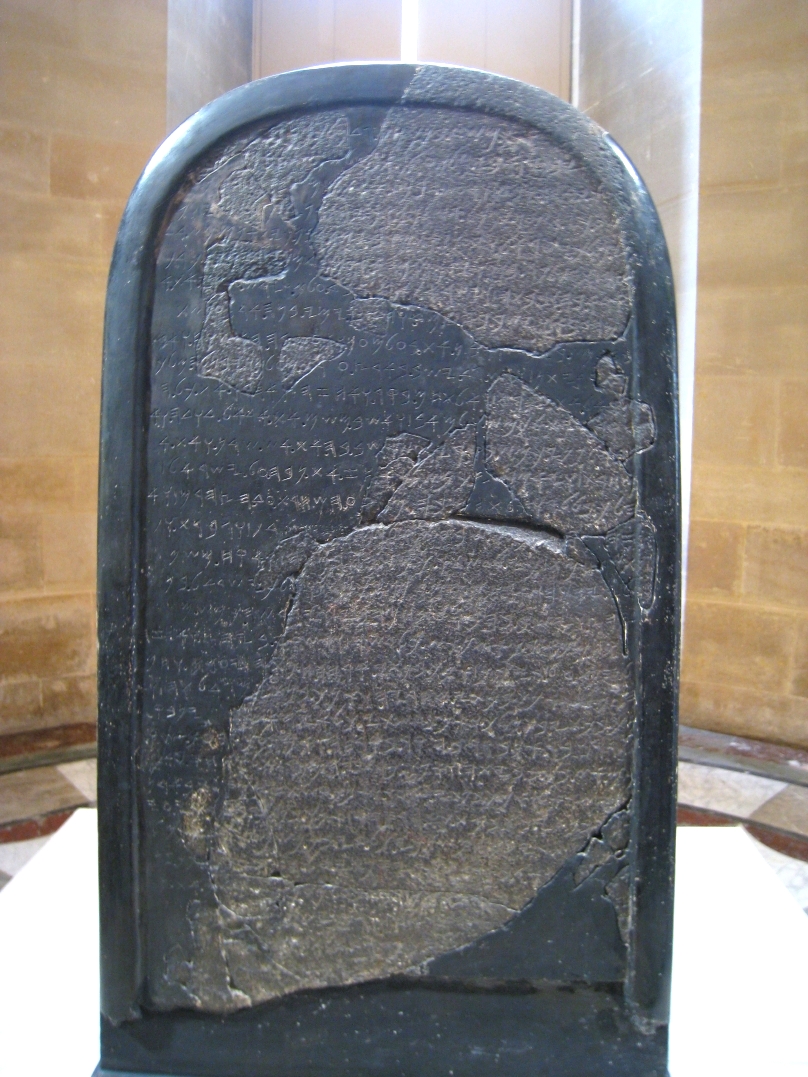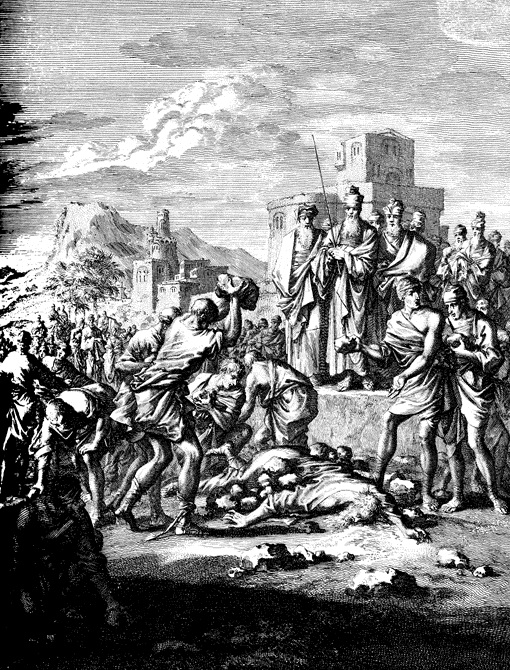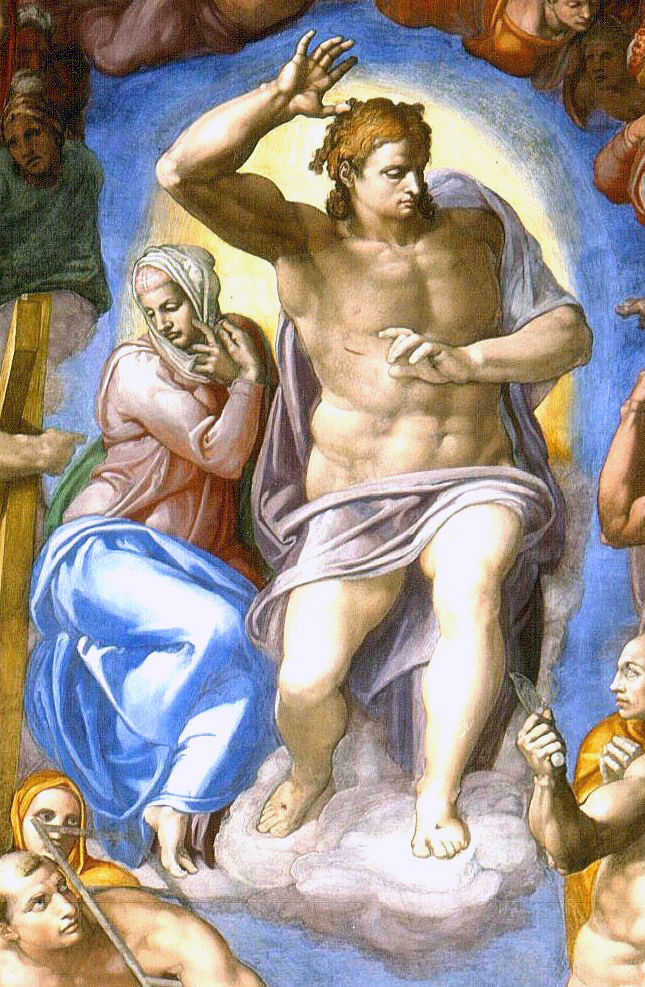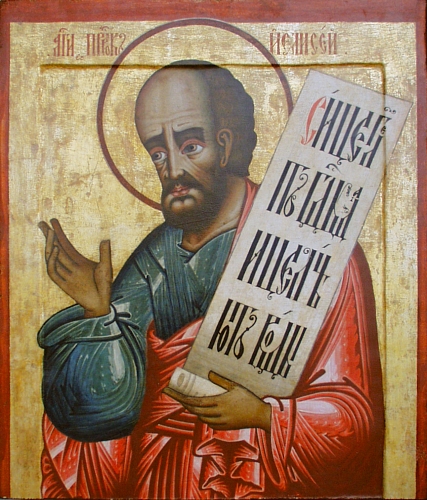|
Jehu Of Israel
) as depicted on the Black Obelisk of Shalmaneser III , succession = King of Northern Israel , reign = c. 841–814 BCE , coronation = Ramoth-Gilead, Israel , birth_date = c. 882 BCE , death_date = c. 814 BCE , burial_place = Samaria, Kingdom of Israel , predecessor = Jehoram , successor = Jehoahaz , issue = Jehoahaz , father = Jehoshaphat Jehu ( he, יֵהוּא, translit=Yēhūʾ, meaning "Yahu is He"; akk, 𒅀𒌑𒀀 ''Ya'úa'' 'ia-ú-a'' la, Iehu) was the tenth king of the northern Kingdom of Israel since Jeroboam I, noted for exterminating the house of Ahab. He was the son of Jehoshaphat, grandson of Nimshi, and possibly great-grandson of Omri, although the latter notion is not supported by the biblical text. His reign lasted for 28 years. William F. Albright has dated his reign to 842–815 BCE, while E. R. Thiele offers the dates 841–814 BCE. The principal source for the events of his reign comes from 2 Kings. Biblical ... [...More Info...] [...Related Items...] OR: [Wikipedia] [Google] [Baidu] |
Omri
Omri ( ; he, , ''‘Omrī''; akk, 𒄷𒌝𒊑𒄿 ''Ḫûmrî'' 'ḫu-um-ri-i'' fl. 9th century BC) was, according to the Hebrew Bible, the sixth king of Israel. He was a successful military campaigner who extended the northern kingdom of Israel. Other monarchs from the House of Omri are Ahab, Ahaziah, Joram, and Athaliah. Like his predecessor, king Zimri, who ruled for only seven days, Omri is the second king mentioned in the Bible without a statement of his tribal origin. One possibility, though unproven, is that he was of the tribe of Issachar. Nothing is said in Scripture about the lineage of Omri. His name may be Amorite, Arabic, or Hebrew in origin.Thiel, W., "Omri", ''The Anchor Bible Dictionary'', p. 17, vol. 5, D.N. Freedman (ed.). New York: Doubleday (1992) Omri is credited with the construction of Samaria and establishing it as his capital. Although the Bible is silent about other actions taken during his reign, he is described as doing more evil than all the ... [...More Info...] [...Related Items...] OR: [Wikipedia] [Google] [Baidu] |
The Mysterious Numbers Of The Hebrew Kings
''The Mysterious Numbers of the Hebrew Kings'' (1951) is a reconstruction of the chronology of the kingdoms of Israel and Judah by Edwin R. Thiele. The book was originally his doctoral dissertation and is widely regarded as the definitive work on the chronology of Hebrew Kings. The book is considered the classic and comprehensive work in reckoning the accession of kings, calendars, and co-regencies, based on biblical and extra-biblical sources. Biblical chronology The chronology of the kings of Israel and Judah rests primarily on a series of reign lengths and cross references within the books of Kings and Chronicles, in which the accession of each king is dated in terms of the reign of his contemporary in either the southern Kingdom of Judah or the northern Kingdom of Israel, and fitting them into the chronology of other ancient civilizations. However, some of the biblical cross references did not seem to match, so that a reign which is said to have lasted for 20 years results ... [...More Info...] [...Related Items...] OR: [Wikipedia] [Google] [Baidu] |
Naboth
Naboth ( he, נבות) was a citizen of Jezreel. According to the Book of Kings in the Hebrew Bible, he was executed by Queen Jezebel so that her husband Ahab could possess his vineyard. Narrative 1 Kings 21:1-16 states that Naboth owned a vineyard, in proximity to King Ahab's palace in the city of Jezreel. Because of this, Ahab desired to acquire the vineyard so that he could use it for a vegetable (or herb) garden. Since he inherited the land from his ancestors, Naboth refused to sell it to Ahab. According to the Mosaic law, the law forbade the permanent selling of land. Frustrated at not being able to procure the vineyard, Ahab returned to his palace and went to bed without eating anything. His wife, Jezebel, after learning the reason for his being upset, asked mockingly, "Are you not the king?" She then said that she would obtain the vineyard for him. To do so, she sent a letter, under Ahab's name, to the elders and nobles of Naboth's city, instructing them to entrap Nabo ... [...More Info...] [...Related Items...] OR: [Wikipedia] [Google] [Baidu] |
Andrea Celesti - Queen Jezabel Being Punished By Jehu - WGA4622
Andrea is a given name which is common worldwide for both males and females, cognate to Andreas, Andrej and Andrew. Origin of the name The name derives from the Greek word ἀνήρ (''anēr''), genitive ἀνδρός (''andrós''), that refers to man as opposed to woman (whereas ''man'' in the sense of ''human being'' is ἄνθρωπος, ''ánthropos''). The original male Greek name, ''Andréas'', represents the hypocoristic, with endearment functions, of male Greek names composed with the ''andr-'' prefix, like Androgeos (''man of the earth''), Androcles (''man of glory''), Andronikos (''man of victory''). In the year 2006, it was the third most popular name in Italy with 3.1% of newborns. It is one of the Italian male names ending in ''a'', with others being Elia (Elias), Enea (Aeneas), Luca ( Lucas), Mattia (Matthias), Nicola (Nicholas), Tobia (Tobias). In recent and past times it has also been used on occasion as a female name in Italy and in Spain, where it is consi ... [...More Info...] [...Related Items...] OR: [Wikipedia] [Google] [Baidu] |
Catholic Encyclopedia
The ''Catholic Encyclopedia: An International Work of Reference on the Constitution, Doctrine, Discipline, and History of the Catholic Church'' (also referred to as the ''Old Catholic Encyclopedia'' and the ''Original Catholic Encyclopedia'') is an English-language encyclopedia published in the United States and designed to serve the Catholic Church. The first volume appeared in March 1907 and the last three volumes appeared in 1912, followed by a master index volume in 1914 and later supplementary volumes. It was designed "to give its readers full and authoritative information on the entire cycle of Catholic interests, action and doctrine". The ''Catholic Encyclopedia'' was published by the Robert Appleton Company (RAC), a publishing company incorporated at New York in February 1905 for the express purpose of publishing the encyclopedia. The five members of the encyclopedia's Editorial Board also served as the directors of the company. In 1912 the company's name was changed to ... [...More Info...] [...Related Items...] OR: [Wikipedia] [Google] [Baidu] |
Divine Judgment
Divine judgment means the judgment of God or other supreme beings within a religion. Ancient beliefs In ancient Sumerian religion, the sun-god Utu and his twin sister Inanna were believed to be the enforcers of divine justice. Utu, as the god of the sun, was believed to see all things that happened during the day and Inanna was believed to hunt down and punish those who had committed acts of transgression. After she was raped in her sleep by the gardener Shukaletuda, she unleashed a series of plagues upon the whole world before tracking him down and killing him in the mountains. In another story, she hunted down the old bandit woman Bilulu, who had murdered her husband Dumuzid, and turned her into a waterskin. The Sumerians, as well as later Mesopotamian peoples, believed that all mortals went to the same afterlife: Kur, a cold, dark, cavern deep beneath the earth. Kur was miserable for all people and a person's actions during life had no impact whatsoever on how he or she ... [...More Info...] [...Related Items...] OR: [Wikipedia] [Google] [Baidu] |
Elisha
Elisha ( ; or "God is my salvation", Greek: , ''Elis îos'' or , ''Elisaié,'' Latin: ''Eliseus'') was, according to the Hebrew Bible, a prophet and a wonder-worker. His name is commonly transliterated into English as Elisha via Hebrew, Eliseus via Greek and Latin, or Alyasa via Arabic, and Elyasa or Elyesa via Turkish. Also mentioned in the New Testament and the Quran, Elisha is venerated as a prophet in Judaism, Christianity and Islam and writings of the Baháʼí Faith refer to him by name. Before he settled in Samaria, Elisha passed some time on Mount Carmel. He served from 892 until 832 BC as an advisor to the third through the eighth kings of Judah, holding the office of "prophet in Israel". He is called a patriot because of his help to soldiers and kings. In the biblical narrative, he is a disciple and protégé of Elijah, and after Elijah was taken up in a whirlwind, Elisha received a double portion of his power and he was accepted as the leader of the sons of th ... [...More Info...] [...Related Items...] OR: [Wikipedia] [Google] [Baidu] |
Books Of Kings
The Book of Kings (, '' Sēfer Məlāḵīm'') is a book in the Hebrew Bible, found as two books (1–2 Kings) in the Old Testament of the Christian Bible. It concludes the Deuteronomistic history, a history of Israel also including the books of Joshua, Judges and Samuel. Biblical commentators believe the Books of Kings were written to provide a theological explanation for the destruction of the Kingdom of Judah by Babylon in c. 586 BCE and to provide a foundation for a return from Babylonian exile.Sweeney, p1/ref> The two books of Kings present a history of ancient Israel and Judah, from the death of King David to the release of Jehoiachin from imprisonment in Babylon—a period of some 400 years (). Scholars tend to treat the books as consisting of a first edition from the late 7th century BCE and of a second and final edition from the mid-6th century BCE.Fretheim, p. 7 Contents The Jerusalem Bible divides the two Books of Kings into eight sections: *1 Kings 1:1 ... [...More Info...] [...Related Items...] OR: [Wikipedia] [Google] [Baidu] |
Athaliah
Athaliah ( el, Γοθολία ''Gotholía''; la, Athalia) was the daughter of either king Omri, or of King Ahab and Queen Jezebel of Israel, the queen consort of Judah as the wife of King Jehoram, a descendant of King David, and later queen regnant c. 841–835 BCE. Biblical narrative Accounts of the life of Athaliah are to be found in 2 Kings 8:16–11:16 and 2 Chronicles 22:10–23:15 in the Hebrew Bible. The text states that she was the daughter of king Omri of Israel, however, she is usually considered to have been the daughter of King Ahab and his wife, Queen Jezebel. Some scholars are of the opinion that Athaliah was indeed the daughter of Omri, but that she grew up as an orphan in the court of Ahab. Athaliah was married to Jehoram of Judah to seal a treaty between the kingdoms of Israel and Judah, and to secure his position Jehoram killed his six brothers. Jehoram became king of Judah in the fifth year of Joram of Israel's reign (). Depending on her paterni ... [...More Info...] [...Related Items...] OR: [Wikipedia] [Google] [Baidu] |
Kingdom Of Judah
The Kingdom of Judah ( he, , ''Yəhūdā''; akk, 𒅀𒌑𒁕𒀀𒀀 ''Ya'údâ'' 'ia-ú-da-a-a'' arc, 𐤁𐤉𐤕𐤃𐤅𐤃 ''Bēyt Dāwīḏ'', " House of David") was an Israelite kingdom of the Southern Levant during the Iron Age. Centered in Judea, the kingdom's capital was Jerusalem. The other Israelite polity, the Kingdom of Israel, lay to the north. Jews are named after Judah and are primarily descended from it. The Hebrew Bible depicts the Kingdom of Judah as a successor to the United Kingdom of Israel, a term denoting the united monarchy under biblical kings Saul, David and Solomon and covering the territory of Judah and Israel. However, during the 1980s, some biblical scholars began to argue that the archaeological evidence for an extensive kingdom before the late-8th century BCE is too weak, and that the methodology used to obtain the evidence is flawed. In the 10th and early 9th centuries BCE, the territory of Judah appears to have been sparsely populated, ... [...More Info...] [...Related Items...] OR: [Wikipedia] [Google] [Baidu] |
Ahaziah Of Judah
{{Short pages monitor ...
Ahaziah ( he, אֲחַזְיָהוּ, "held by Yah(-weh)"; Douay–Rheims: Ochozias) was the name of two kings mentioned in the Hebrew Bible: *Ahaziah of Israel *Ahaziah of Judah Ahaziah ( he, אֲחַזְיָהוּ, "held by Yah(-weh)"; Douay–Rheims: Ochozias) was the name of two kings mentioned in the Hebrew Bible The Hebrew Bible or Tanakh (; [...More Info...] [...Related Items...] OR: [Wikipedia] [Google] [Baidu] |
Jezreel (city)
Tel Jezreel ( he, יִזְרְעֶאל ''Yīzrə‘e’l'', "God will sow") is an archaeological site in the eastern Jezreel Valley in northern Israel. The city of Jezreel served as a main fortress of the Kingdom of Israel (Samaria), Kingdom of Israel under king Ahab in the 9th century BCE. Biblical references Prior to the division of the United Kingdom of Israel, the city was the hometown of Ahinoam, second wife of King David, Michal, Saul's daughter, being the first, Ahinoam being his second, and Abigail, widow of Nabal, being his third (). According to the First Books of Kings, Book of Kings, the royal palace of Ahab, King Ahab, "one of the most famous of the royal residences of the kings of Israel", was in Jezreel, adjacent to the vineyard of Naboth (). Ahab's capital remained in Samaria (ancient city), Samaria. According to , following the prophet Elijah's victory over the prophets of Baal, Ba'al at Mount Carmel, Elijah instructs Ahab to return home to Jezreel, where he ... [...More Info...] [...Related Items...] OR: [Wikipedia] [Google] [Baidu] |









